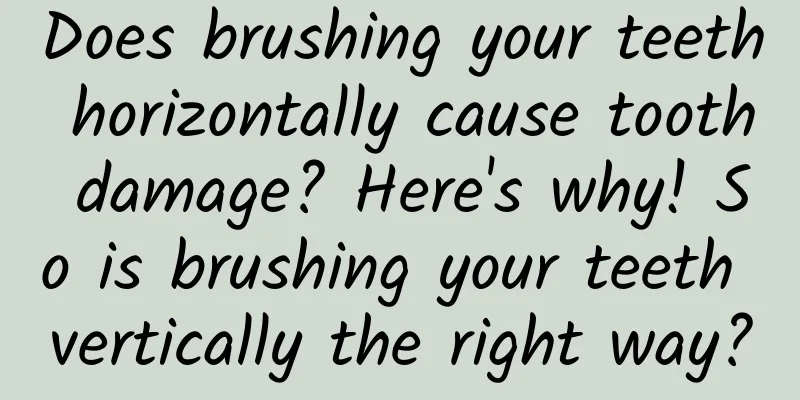Does brushing your teeth horizontally cause tooth damage? Here's why! So is brushing your teeth vertically the right way?

|
Recent A woman brushed her teeth horizontally for a long time. Causes teeth to become chipped #27-year-old woman's teeth damaged due to long-term horizontal brushing# The doctor diagnosed that Wedge-shaped defects caused by long-term horizontal brushing So What is a wedge-shaped defect? How is a wedge-shaped defect caused? When brushing your teeth, should you brush your teeth horizontally or vertically? How to prevent it scientifically? Let’s find out! What is a “wedge-shaped defect”? A wedge-shaped defect is a defect caused by the slow consumption of the hard tissues at the cervical and labial sides of the teeth. It is V-shaped and is called a wedge-shaped defect because it resembles a carpenter's wedge. Generally, the symptoms worsen with age and are more common among middle-aged and elderly people. Wedge-shaped defect Wedge-shaped defects can be divided into three categories according to the degree of the defect: shallow, moderate, and deep. They can also cause the following symptoms: tooth sensitivity, tooth pain, pulp inflammation, and gingival atrophy. How is a wedge-shaped defect caused? 1. Improper brushing This is the main reason for wedge-shaped defects, also known as tooth brushing wear. The reasons are: (1) Horizontal brushing is the most deadly Horizontal brushing is the main cause of wedge-shaped defects! People who use a hard toothbrush to brush horizontally for a long time often have typical and severe wedge-shaped defects. Canines and bicuspids at the corners of the mouth are also often the main affected areas. (2) Brushing Too Hard If you brush your teeth too hard, it may cause tooth tissue fracture, tooth defect, or wedge-shaped defect at the neck of the tooth, and may cause tooth sensitivity. According to statistics, men are more likely to have wedge-shaped defects than women, which may be a "side effect" of too much force. Therefore, we should brush our teeth gently. (3) Use a hard-bristled toothbrush It is difficult to clean the dental plaque between teeth and hidden surfaces with a hard-bristle brush, and the cleaning effect is not ideal. At the same time, a hard-bristle brush can easily scratch the gums, causing gum bleeding, and accelerate the exposure of the tooth roots and the formation of wedge-shaped defects. Therefore, it is recommended to choose a toothbrush with softer bristles. After brushing your teeth, rinse the toothbrush repeatedly with clean water, shake dry the bristles, and place the brush head upward in a ventilated place. 2. Structure of the tooth neck Disadvantages of tooth structure: The enamel-cementum junction at the neck of the tooth is the part with the least or no enamel and cementum coverage in the entire tooth. It is the weak link in the tooth structure. The gums are prone to inflammation and atrophy at this point, leading to exposed root surfaces. Therefore, this part has the lowest wear resistance and is easily subject to wear and defects. 3. Effect of acid The wedge-shaped defect is usually close to the gums, where there is a lot of saliva in the gingival sulcus. The saliva contains some acidic substances, which can corrode the teeth. In addition to the acid in the saliva, the acidic food you eat and the acid reflux from stomach problems can also corrode the teeth, causing defects in the neck of the teeth. 4. Stress concentration When an object is subjected to force, the force per unit cross-sectional area at any moment is called stress. Stress is the density of internal force on the cross-sectional area. When stress increases sharply, it is called stress concentration. The cervical area on the labial and buccal side of the tooth is the stress concentration area of the bite force. Long-term excessive chewing force and a love of biting hard objects will cause fatigue of tooth tissues, resulting in damage in the stress concentration area, which will increase the probability of defects. In summary, it is generally believed that wedge-shaped defects are the result of the combined action of multiple factors. How to treat wedge-shaped defects? 1. For wedge-shaped defects with very small loss and no symptoms, you only need to change your brushing method and no treatment is necessary. 2. Although the defect is small, if the teeth are still sensitive to cold and heat, desensitization treatment can be used with desensitizers on the basis of changing the brushing method. 3. Patients with larger defects need filling or root canal treatment depending on the situation . Of course, maintaining good brushing habits after treatment is also essential. It is recommended to use the Bass brushing method It is recommended not to brush your teeth just horizontally or vertically. The Bass method is recommended, using a toothbrush with softer bristles and brushing for no less than 3 minutes. Bass brushing method Place the brush head on the neck of the tooth, with the bristles at a 45° angle to the long axis of the tooth; Just apply gentle pressure, don't use too much force, and make sure part of the bristles are in the gingival sulcus and part of them are on the gums; 2-3 teeth form a group, starting from the buccal side of the posterior teeth; Brush the same area back and forth several times with short horizontal vibrations; Rotate the toothbrush toward the crown and brush the cheek surface. This completes a set. 2. Adjust your eating habits Acidic foods can cause demineralization of the tooth neck tissue, which is prone to wedge-shaped defects when rubbed. You should try to reduce the intake of acidic foods and avoid biting hard foods with your front teeth. 3. Treat digestive system related diseases Diseases such as gastroesophageal reflux disease can create an acidic environment in the mouth, causing certain damage to the teeth. If there are any digestive system-related diseases, they should be actively treated. 4. Correct bad biting habits If the teeth are not aligned properly and affect the bite, the bite needs to be adjusted to eliminate the high tooth tips and sharp edges. |
Recommend
Does your child always catch colds? Be careful, it may be this virus that is causing trouble!
Just after work in the afternoon, a mother rushed...
What is the reason for low blood pressure in women?
Low blood pressure is an increasingly common dise...
Is it a boy or a girl if the belly button is protruding?
Many friends are actually very interested in the ...
A healthy intestine is the key to long-term health. Beware of the threat of inflammatory bowel disease
Author: Li Teng, Suzhou Hospital Affiliated to An...
Introduction to the treatment of uterine tumors
Speaking of uterine fibroids, I believe that all ...
Picture of 8-month-old fetus in the belly
When the pregnancy reaches 8 months, the fetus is...
National Health Commission: 20 health tips for myopia prevention and control during winter vacation
1. Will the risk of myopia be reduced while stayi...
Will a girl have her period when she is pregnant?
Menstruation is a woman's "best friend&q...
What is menstrual rash?
Menstrual rash is a type of allergic dermatitis, ...
What are the symptoms of severe spleen deficiency in women?
Spleen deficiency is relatively common in life, a...
Can I get pregnant if my menstrual blood is dark?
Menstruation, which occurs once a month, is a nor...
How to take pulse to know if you are pregnant
When you are pregnant, you must go to the hospita...
What kind of fabric is a horse-faced skirt usually made of? How wide should the opening of a horse-faced skirt be?
The horse-faced skirt originated in the Ming Dyna...
What are the symptoms of kidney deficiency in girls?
Let me introduce to you several symptoms of kidne...
Can I have sex before the transplant? Grasp the timing
For couples who have difficulty conceiving natura...









